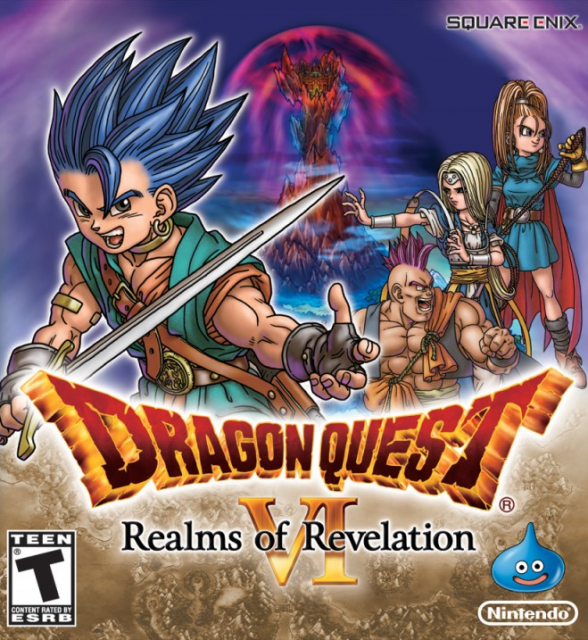Finally!
Dragon Quest’s Zenithian Trilogy finally wraps up with the long-awaited release of Dragon Quest VI: Realms of Revelation. It’s a remake of the beloved Japan-only Super Famicom role-playing game from 1995, and marks the first time it is available in English. The 16-bit original is now 16 years old, and like the remakes of its siblings Dragon Quest IV and V, the new version has been dusted off by updated graphics, music, and some online features. It’s a straight-forward JRPG that, unlike its primary rival Final Fantasy, never takes itself too seriously.
Story
The main thread connecting the games in the Zenithian Trilogy is the titular castle that floats high above the mortal realm, and a nameless hero who must collect a legendary set of equipment to destroy an evil menace. It’s a loose connection that barely ties the games together, allowing each chapter to stand on its own.
This particular entry is unique in the Dragon Quest universe thanks to its primary plot device; the existence of two separate but intimately connected worlds. The player will travel between both worlds frequently and their actions in one world will have ripple effects across both. This almost doubles the number of areas to explore, though it doesn’t feel substantially longer than previous games, and there are a slew of vehicles to make traveling a breeze.
The overarching plot isn’t given as much thought as the episodic events encountered in each new town or castle. It would be easy for this formula to run out of steam out of sheer repetition, but the Dragon Quest series has consistently shattered sales records thanks to its imaginative scenarios. Unfortunately, the game lacks the sort of engaging main villains and cohesive plot we have come to expect from RPGs as a result of its fairly non-linear design. Your access to new areas is limited to what vehicles you possess, but you are otherwise free to complete objectives in whatever order you please.
One of the highlights of the game is how peasant characters in every area have a number of things to say depending on different circumstances. For example, when you’re first exploring a town they may complain about what’s been troubling them, or they may try to hide things from you. Once you’ve agreed to help them out, the townspeople will cheer you on and perhaps offer helpful hints. Finally, upon completing your objective, the people will tell you how your good deed has changed their lives. If you return to an area much later on, you may be surprised by new developments. Repeatedly speaking with the locals is rewarding because they really give you a sense that your actions have changed the world.
Job System
Your heroes will gradually get stronger and learn new techniques as you gain experience, but you’ll also be able to customize their abilities by assigning specific classes at Alltrades Abbey around 10 hours into the adventure. The same classes from Dragon Quest IX are available, along with a few others, though the system is much less involved and the jobs can be mastered much more quickly.
Classes no longer dictate what equipment your characters can use, and you don’t need to individually assign points to gain specific abilities. Instead, your characters will simply learn new class-specific abilities after they fight a set number of battles. Additionally, any abilities you learn will be accessible from that point on, regardless of your current class. It’s a nice way to customize your characters without any of the frustration or penalties normally associated with other job systems, though attaining the secret classes will require some grinding.
Presentation
The graphics have been given the same face-lift seen in the previous two remakes. The settings are now built in 3D and spread across both screens, and you can rotate your point of view using the shoulder buttons to plan a path with less backtracking. The bevvy of (mostly) new monsters have been brought to life with smooth animations that really add character to the many random encounters. It’s a good look, and a happy medium between the original game and what we’ve come to expect from DS software. And though the game lacks the cinematic presentation seen in Dragon Quest IX, it does feature a few snazzy in-game moments that highlight major plot points.
Although the music fits the medieval setting like a glove, there simply isn’t enough variety which is particularly troublesome for an RPG. Whereas many RPG soundtracks could fill 2 or 3 CDs, this one could easily fit onto a single disc. Given the game’s length and variety of areas, the soundtrack becomes repetitive and doesn’t add any distinct personality to exotic locations, which is a shame. The problem is further compounded due to the recycling of a few songs from earlier games.
Closing Thoughts
Compared to recent releases and even its contemporaries Final Fantasy 6 or Chrono Trigger, Dragon Quest VI’s story feels less epic (though the game is no less epic in scope) and may seem a little bit outdated. Stubbornly adhering to series’ tradition, the simplistic storyline and lack of character development is smoothed over by the minutiae to be found in the game’s world, which is hard not to love. Each scenario has been dutifully crafted, but unless you’re willing to take the time to speak to everyone multiple times you will miss out on it. The Job System moves quickly, and the game provides a good challenge when battling the boss monsters or trying to figure out what to do next. Side quests like collecting mini-medals, raising and battling slimes, and the Slime Curling mini-game serve up fun diversions, but the tag-mode function is lame. Although I would rank Dragon Quest V as my favorite amongst the Zenithian Trilogy, RPG fans shouldn’t miss the opportunity to finally play this elusive chapter.
This is a repost from my website: www.plasticpals.com
